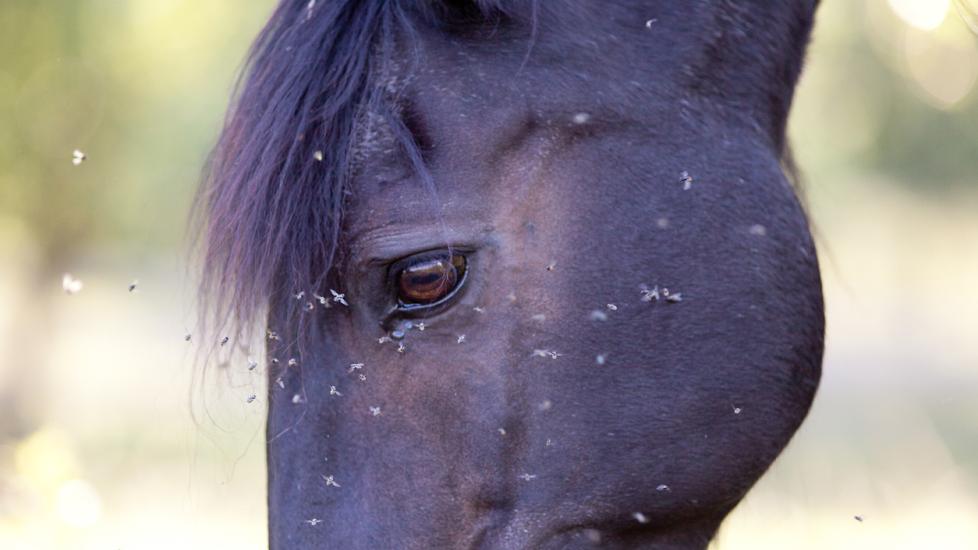West Nile Virus in Horses
What is West Nile Virus in Horses?
West Nile virus (WNV) is a virus that is transmitted by mosquitoes and can cause neurologic issues in horses and people.
This disease can impact horses of any age, breed, or lifestyle, since mosquitos can still reach horses even if they are kept in the barn 24/7. The horses that are most at risk for developing symptoms are those that are unvaccinated or very newly vaccinated.
WNV is not a nationally reportable disease, but your state’s regulations may be different. If you or your veterinarian suspects a possible WNV infection, check in with your state veterinarian to learn your local regulations.
Symptoms of West Nile Virus in Horses
Early signs of WNV include:
-
Fever
-
Decreased appetite
-
Decreased energy
If the disease continues to progress and the virus crosses the blood-brain barrier, a horse may start to show some of the following neurologic signs:
-
Muscle twitching
-
Disorientation
-
Circling
-
Weakness
-
Listlessness
-
Ataxia (incoordination/inability to fully control one or more limbs)
-
Hyperexcitability/hypersensitivity
-
Changes in mental state possibly including inappropriate aggression
Severe/end stage signs include:
-
Paralysis
-
Seizures
-
Coma
Many horses can recover completely from WNV with only supportive care. However, if the disease progresses to the more severe signs, it is almost always fatal.
Causes of West Nile Virus in Horses
WNV is transmitted to horses when a mosquito carrying the virus bites and takes its blood meal.
Birds are considered the reservoir host. This means that the virus lives in the bird population, and this is the primary place where mosquitoes pick up the virus to infect people and horses. Horses and people cannot give the virus to each other; not enough of the virus stays in the bloodstream of horses or people to be picked back up again by mosquitoes.
How Veterinarians Diagnose West Nile Virus in Horses
Diagnosis of WNV can be confirmed using several methods.
-
Antibody titers can be used. For these, it is often necessary to take two samples 2-4 weeks apart.
-
If a more immediate answer is needed, CSF (cerebrospinal fluid) samples may be needed, especially in neurologic cases.
Treatment of West Nile Virus in Horses
There is no cure for WNV. Most treatment revolves around supportive care and anti-inflammatories to help decrease brain and spinal cord inflammation.
Supportive care usually involves fluid and nutritional support including intravenous (IV) fluid therapy to prevent the horse from becoming dehydrated. Common anti-inflammatories used are non-steroidal anti-inflammatory drugs (NSAIDs) such as phenylbutazone or banamine.
In severe cases, the veterinarian may consider using steroids (dexamethasone and prednisolone) to address the inflammation. Severe neurologic cases may need additional support including sedation to help prevent the horse from injuring themselves if they are circling or disoriented. If the horse has become paralyzed or partially paralyzed, a sling may help to keep them standing.
Your veterinarian will recommend any additional treatments based on the clinical signs that your horse is showing.
Recovery and Management of West Nile Virus in Horses
Horses with WNV that only show mild symptoms usually recover with no long-term side effects of the disease. Horses with more severe forms and neurologic symptoms, can experience lasting side effects including:
-
Ataxia
-
Lameness
-
Behavioral changes
Exercise and lifestyle recommendations will differ depending on any long-term effects your horse may be experiencing. Some horses may return to their normal exercise regimen once fully recovered with no lasting concerns. However, if your horse is still uncoordinated, your veterinarian may recommend that riding is no longer safe or even that full pasture turnout is the best and safest option for the horse.
Prevention of West Nile Virus in Horses
Vaccination and mosquito control are the two primary methods of preventing WNV in horses. An initial 2 dose series is needed for all previously unvaccinated horses or horses with unknown vaccine histories. This is typically done in foals around 3-4 months of age. After the initial series, horses should be given a booster annually in the spring.
To help control mosquitos, remove any areas of standing water quickly. Fully empty and clean water buckets and troughs regularly.
West Nile Virus in Horses FAQs
Can horses recover from West Nile virus?
Yes, most horses can recover from WNV. In some cases, however, the disease is fatal or may have lasting, permanent, side effects.
How long does West Nile virus last in horses?
Depending on the severity of symptoms, the initial disease can last days to weeks or even months.
Is equine West Nile virus contagious?
WNV is not contagious between horses or between horses and people. Mosquitos can only pick up the virus from the reservoir host (birds) and give it to horses and people from there.
References
-
Washington State University. West Nile Virus (WNV). WADDL.
-
USDA. West Nile Virus Transmission Cycle. Animal and Plant Health Inspection Service.
-
Centers for Disease Control and Prevention. West Nile Virus. Centers for Disease Control and Prevention. 2022.
Featured Image: iStock.com/anjajuli
